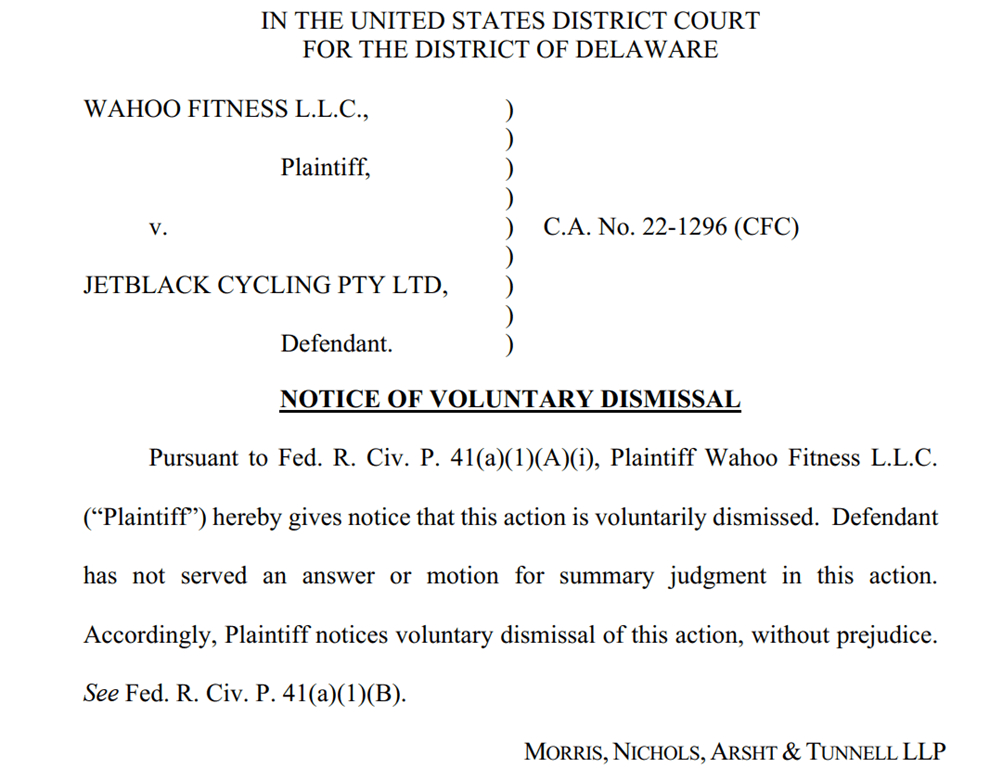Wahoo's settlement with JetBlack lawsuit explained - case against Zwift continues
Wahoo sets timeline and hearing date for ZwiftHub lawsuit

On the 2nd of December, it was reported that Wahoo Fitness had dismissed its patent infringement lawsuit against competitor indoor trainer brand, JetBlack, while doubling down on a related case against Zwift.
At the time, there were no details surrounding what settlement - if any - had been made with JetBlack, as the brand's attention turned solely to the Zwift case. However, Cyclingnews can today reveal a statement from Wahoo Fitness confirming those details.
Wahoo has said:
"Wahoo and JetBlack have amicably settled the patent lawsuit Wahoo filed against JetBlack. As a result, JetBlack will cease selling its Volt smart trainer in the United States and Europe - where Wahoo has patents. The other terms of the settlement agreement are confidential. The lawsuit filed against Zwift is a separate case and is still in progress.”

The most significant aspect of this is the confirmation that JetBlack will stop selling its trainer in what are undoubtedly its two biggest territories, the USA and Europe. What this means for the JetBlack brand, and the Volt trainer itself, remains to be seen.
The Zwift Hub trainer, the product around which the separate lawsuit centres, is currently only sold in those two territories. Therefore, it would be difficult for Zwift to agree to the same terms.
The lawsuits explained
On October 3, Wahoo filed suit against both companies - JetBlack and Zwift - for what it claims to be an infringement of patents related to its Kickr range of smart turbo trainers.
The latest race content, interviews, features, reviews and expert buying guides, direct to your inbox!
The case against Zwift was submitted in relation to the Zwift Hub; a new smart trainer announced a few weeks prior on September 6. Documents filed in the United States District Court for the District of Delaware showed that Wahoo believes that Zwift has infringed on three patents, specifically those numbered 10,046,222, 10,933,290, and 11,090,542.
Concurrently, a case against JetBlack was also filed for a claimed infringement of the same patents, relating to the brand's Volt trainer.
The Zwift Hub's inception, and how it relates to JetBlack
In making the Zwift Hub trainer, Zwift originally planned to design its own trainer and smart bike, but was forced to cancel the project with a round of layoffs due to the recession of the indoor cycling market that followed the boom that occured during the pandemic.
Instead, Zwift licensed the design of the existing budget-friendly smart indoor trainer, the JetBlack Volt, making a few small changes to affect compatibility and durability.
What's notable here is that the JetBlack Volt had been already been on sale for two years prior to the lawsuit's filing.
So why now?
Wahoo hasn't confirmed publicly, but the signals are quite clear. The Zwift Hub is a direct competitor to Wahoo's Kickr Core, bearing similar top-level specs such as an 1800-watt maximum resistance and 2% power accuracy. They also look similar, with a drivewheel and flywheel positioned in similar positions, with two diagonal legs extending downward to horizontal unfoldable 'feet'.
But so is the JetBlack Volt, so why now?
The Zwift Hub went on sale to the public on the very same day the lawsuit was filed - October 3 - at a price that undercuts the Wahoo Kickr Core by more than 40%.
It's widely believed that this triggered Wahoo's actions and that in filing suit against Zwift for patent infringements, it couldn't do so without also taking issue with the JetBlack Volt. Put simply, it appears as though the JetBlack case was simply collateral damage swept up with the main target.
Given the JetBlack Volt was being sold at a higher price - more in line with the price of the Kickr Core - it's possible that Wahoo wasn't as sensitive to the possibility its patents were being infringed upon.
The Zwift lawsuit continues
In the weeks since the patent was originally filed, Zwift has denied all counts of infringement. As a result, a timeline of events has been set out, which will culminate in a hearing on April 11, 2023, at 9 AM, presuming no settlement, dismissal, or applications for extension occur beforehand.

Josh is Associate Editor of Cyclingnews – leading our content on the best bikes, kit and the latest breaking tech stories from the pro peloton. He has been with us since the summer of 2019 and throughout that time he's covered everything from buyer's guides and deals to the latest tech news and reviews.
On the bike, Josh has been riding and racing for over 15 years. He started out racing cross country in his teens back when 26-inch wheels and triple chainsets were still mainstream, but he found favour in road racing in his early 20s, racing at a local and national level for Somerset-based Team Tor 2000. These days he rides indoors for convenience and fitness, and outdoors for fun on road, gravel, 'cross and cross-country bikes, the latter usually with his two dogs in tow.